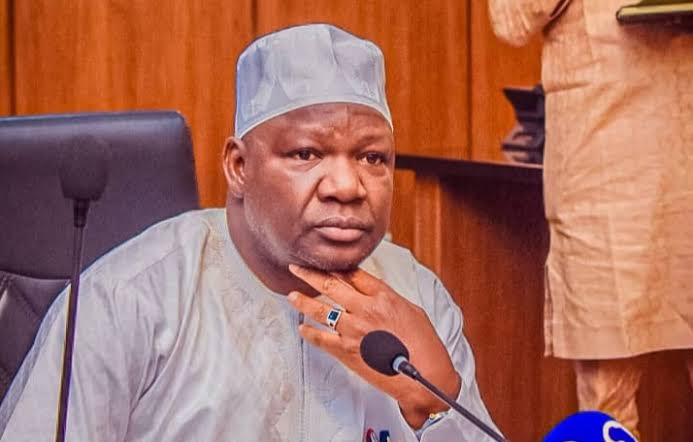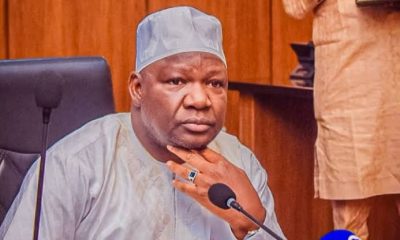News
Reps Pass For Second Reading Bill To Create National Honours Award Commission

News
Weeks to 2nd anniversary, Niger deputy gov, plans to resign, move out personal effects

There are growing reports that Yakubu Garba, the Deputy Governor of Niger State, is on the brink of stepping down from his position, with sources indicating that he has already begun moving his personal belongings out of his official residence.
According to Daily Nigerian, unusual activity indicating a move by the deputy governor to resign was sparked by movements around his official residence over the weekend, suggesting preparations for his departure. Sources close to the deputy governor revealed that he has substantially moved his belongings to his private home, signaling that he could resign at any moment.
The governor and the Secretary to the State Government, SSG are not in the country, the camp of the governor has put pressure on staff in the SSG’s office not to acknowledge any letter of resignation should Garba go ahead to submit it.
As of now, he has moved most of his belongings out of the official residence. He is expected to resign soon,” a source told Daily Nigerian.
Despite these signs, it is unclear if Garba has changed his mind after a reported meeting with some traditional rulers who visited him on Sunday night in an attempt to persuade him to stay in office. Details of the discussions remain unclear, and it is unknown whether they had any impact on his decision.
Insiders suggest that the deputy governor’s decision to resign is driven by a growing rift with the state’s governor, Umaru Bago. According to sources, Garba has been repeatedly sidelined and disrespected within the administration, despite being elected on the same ticket as the governor.
The tension between Garba and Governor Bago intensified recently over the upcoming local government elections. Garba, who hails from Shiroro, had endorsed Babangida Kudodo as the preferred candidate for the APC in the area. However, the final list released by the party’s headquarters featured a different candidate, Isyaku Bawa, a move reportedly made on the governor’s orders.
Further fueling the rift, sources claim that Garba’s influence within the government has diminished, with even his monthly allowances being drastically reduced. “He has been excluded from major government decisions, and his role has been diminished despite his significant contributions to the party and his loyalty to the governor. Even his financial entitlements have been cut,” said an anonymous source.
Despite the widespread speculation, Garba has yet to publicly confirm any plans to resign. His press secretary, Ummikhultume Abdullahi, however, denied any knowledge of a resignation, adding that she had recently met with Garba at his official residence, and he had not yet fully moved out.
As the situation unfolds, many are left wondering whether Garba’s resignation will indeed take place or if ongoing discussions with influential figures in the state will convince him to stay in office.
News
Insecurity: BUDA urges govt to quickly rescue Baruten from terrorists

The Batombu Unity and Development Initiative, Abuja (BUDIA), has raised an alarm over invasion of Baruten in Kwara state by bandits and terrorists, demanding for urgent government intervention.
This was contained in a statement issued and signed by its President, Nasir Abubakar Othman and endorsed by the Board of Trustees.
The nonprofit organization dedicated to advocating for the welfare and development of the Batombu people, expresses grave concern over the worsening insecurity caused by escalating terrorism, which pose a critical threat to lives and properties in Baruten and Kaiama Local Government Areas of Kwara State.
“In recent months, communities in Baruten and Kaiama Local Government Areas, located near Kainji Lake National Park, have endured a surge in violent killings These blood birth has led to tragic loss of lives, widespread destruction of properties and a growing climate of fear and cessation of farming and economic activities.
The violence has displaced and disrupted numerous families, local businesses and agricultural activities, as well as severely destabilized and displaced the affected areas.
BOARD OF TRUSTEES
ALH. YUSUF TUNKU
Chairman
PROF. UMARU SEMO ISHIAKU Member
RT. HON. IBRAHIM ISA BIO
Member
RT. HON. ZAKARI MOHAMMED Member
RT. HON. MOHAMMED OMAR BIO
Member
IBRAHIM ALIYU KPEROGI
Member
SABIYABE YAHAYA Member
EXECUTIVES
BARR. ABUBAKAR NASIR OTHMAN
President
ABDULLAHI KABIR
Vice President
MOHAMMED JIBRIL FCA
General Secretary
ABDULLAHI HALIDU ALIYU
MADAKI’N GWANARA Treasurer
BARR. ABUBAKAR KOTO ALIYU
Legal Adviser
HAJIA AISHA AHMED OYORU President Women Wing
The towns of Chikanda, Yashikira, Kuburufu and Gure are now overwhelmed by the influx of internally displaced persons (IDPs), the majority of whom are women, children, and elderly individuals.
This critical situation calls for immediate intervention from the government and security agencies to restore order and protect vulnerable populations in these communities.
BUDIA commends the Kwara State Governor, Alhaji Abdulrahman Abdulrazaq, along with senior military officials and representatives of security agencies, for visiting Kaiama as part of their ongoing assessment efforts.
However, we strongly urge the government to extend similar assessment visits to the troubled areas of Baruten Local Government Area to address the urgent needs of affected communities and adopt a comprehensive strategy to resolve this crisis.
Similarly, we call on all residents of Baruten and Kaiama to remain law abiding and vigilant, promptly reporting any suspicious activities or unfamiliar movements of strangers to security agencies stationed within their communities and to traditional rulers.
BUDIA stands in solidarity with all sons and daughters of Baruten and Kaiama as we urgently appeal for decisive military intervention to end the violence and restore peace and stability in our communities.
News
Kano Judiciary Takes Action Against Judges, Suspend Registrars Over Misconduct

The Kano State Judicial Service Commission has taken disciplinary action against two court registrars and two Upper Shari’a Court judges over misconduct.
This was contained in a statement issued by the spokesperson for the Kano State Judiciary, Mr Baba Jibo-Ibrahim, on Monday in Kano.
He said that the decision was part of the resolutions reached at the JSC’s 80th meeting held on April 22, 2025.
He said the commission, in line with its mandate, adopted the recommendations of the investigation carried out by the Judiciary Public Complaints Committee and resolved to suspend and issue formal warnings to them.
Those suspended are Ibrahim Adamu, Principal Registrar II of the Kano High Court, and Maigida Lawan, Principal Registrar of the Sharia Court of Appeal.
Upper Sharia Court Judges Alkali Mansur Ibrahim and Nasiru Ahmad were issued warnings.
Jibo-Ibrahim said Adamu, a Principal Registrar II of the Kano High Court of Justice, was suspended without pay for six months.
The statement added, “His promotion is deferred after a finding that confirmed he verbally assaulted and attempted to use physical force against his superior officer, amounting to gross misconduct in violation of the provisions of the Kano State Civil Service Rules 2004 and the JSC Regulations.
“This is the second time Adamu has appeared before an investigative committee for violence-related actions at work, and he has been issued a series of queries.”
The commission found Adamu’s actions to be grossly unbecoming of his office and imposed the appropriate disciplinary sanctions.
The statement said Lawan, a Principal Registrar of the Kano State Sharia Court of Appeal, was suspended without pay for six months, immediately, after being found guilty of demanding and accepting improper gratification under false pretences.
“The commission adopted the recommendation of the JPCC, and Lawan was demoted by one grade level (from GL-13 down to GL-12),” the statement read.
He said that the commission issued a warning to Malam Mansur Ibrahim, an Upper Shari’a Court judge, after evidence confirmed he used insulting and abusive language towards a litigant.
The JSC also issued a formal warning to Nasiru Ahmad, an Upper Shari’a Court judge, for ordering the detention of a judgment debtor in a manner that suggested personal interest and compromised judicial impartiality.
-

 News8 hours ago
News8 hours agoJust in: Senator Natasha tenders satirical ‘apology’ to Akpabio
-

 News24 hours ago
News24 hours agoGunmen abduct two senior LG workers, three others
-

 News5 hours ago
News5 hours agoUNUSUAL! Without invitation, Police declared me wanted — Daughter of ABC Transport owner
-

 News17 hours ago
News17 hours agoBenue LG chairman gives Fulanis 48hrs to leave all farmlands
-

 News23 hours ago
News23 hours agoFrancophone Ambassadors, Nigeria Unite To Fight Against Climate Change
-

 News3 hours ago
News3 hours agoInsecurity: BUDA urges govt to quickly rescue Baruten from terrorists
-

 News1 hour ago
News1 hour agoWeeks to 2nd anniversary, Niger deputy gov, plans to resign, move out personal effects
-

 News17 hours ago
News17 hours agoFive suspected kidnappers eliminated by police in Delta



